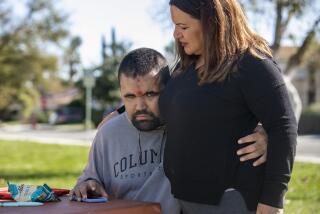Who Should Get the Kids? : 2 Children Shuttle Between Their Parents and Grandparents as Both Sides Struggle for Custody
- Share via
Over here are Lew and Ellen, the grandparents. Over there, Natalie and Ray, the parents. And in the middle--where children always are in these cases--are Amanda, 3, and a pixie of 2 named Ashley.
This is a family divided--grandparents against parents--by a custody battle over the two little girls. It’s a fight brought on by drug use, charges of child abuse and by a generation gap in values.
“She wants to be the Dearest Mommy, to over-exceed,” Natalie FranKs, 22, says of her mother.
“It’s all so confused and screwed up”--that’s how Ray McGill, 24, the girls’ father, puts it.
“It’s a horror,” says Ellen FranKs, 45, their grandmother.
“It appears to me (daughter Natalie) doesn’t have the capability of showing love to those girls,” says grandfather Lew FranKs, 47.
Social workers say Amanda and Ashley’s case is typical of an increasing number of custody disputes, in which people are trying to take their grandchildren from children they say are too troubled to care for them. The parents, and sometimes, the social-service system insist that keeping the nuclear family together is more important--and that any problems can be resolved.
In this case, Natalie and Ray think they have been unfairly accused of mistreating their children. The accusers include the grandparents, who make no secret of the fact that they want custody.
Each night at bedtime in a small, toy-cluttered house in a low-income area of Hawaiian Gardens, Amanda and Ashley sing this song, taught to them by their grandparents:
Good night, Amanda, good night. Good night, Ashley, good night. Good night, Mommy, Daddy, good night. Good night. We love you. Good night.
Mommy and Daddy live only minutes away. But, since July, 1990, the children have been living with their grandparents under a temporary-care arrangement mandated by Juvenile Dependency Court in Los Angeles County.
The see-saw custody arrangement dates from December, 1988, when a county court ordered Amanda, then 8 months old, removed from her parents’ home. The county Department of Children’s Services reported the mother for failing to provide proper food and medicine for her daughter, who had been diagnosed as having a protein deficiency. Child-abuse allegations were sustained by the juvenile court.
In May, 1989, Ashley was born and doctors said she was a drug baby. Jittery and hyperactive, she was sent home with her grandmother--again, her mother was reported for child abuse.
But that September, both girls were returned to their parents in keeping with the Department of Children’s Services policy to attempt reunification when parents have demonstrated willingness and ability to do better.
The children had been home for almost 10 months when, in July, 1990, Ashley was rushed to a hospital after swallowing Sinequan, an antidepressant that had been prescribed for her father.
This time, a court ruled that both girls be placed in the grandparents’ home. Natalie and Ray were ordered to undergo psychiatric counseling.
Last April 14, Natalie and Ray were given another chance, a 60-day home trial with the girls. Ten days later, the family’s Toyota pickup, with Ray driving and the children riding unrestrained in the back, was broadsided. Adrienne Zackery, the girls’ social worker, says they suffered cuts and bruises on their heads and faces.
Once more, the Department of Children’s Services reported child abuse; there was also a vehicular code violation. Says Thu Nguyen, a supervising children’s social worker based in Santa Fe Springs: “From our point of view, it was a very serious child endangerment situation.” Again, Amanda and Ashley were returned to their grandparents.
The family’s next court date is Oct. 15. Citing their compliance with the agency’s demands that they receive counseling, together with her observations during home visits, Zackery has recommended that the girls be returned to their parents for another 60-day trial period.
Zackery, who took over the case four months ago, notes that Natalie and Ray have tried to comply with court recommendations. Both have received parent counseling and Natalie has completed a drug rehabilitation program. They will undergo family counseling once the children are returned.
If they are granted a home trial, Zackery will visit every two weeks to monitor the children’s medical, physical, emotional and educational needs.
Natalie acknowledges that there was a time when the girls were an inconvenience but, she adds: “We have come a long way. We’ve grown up a lot. Our first priority now is the girls. They’re mine. I want them. They’re my responsibility. We have grown closer as a family.”
Meanwhile, “the county has custody,” grandmother Ellen says. “I have possession.”
“How much do these kids have to go through?” Ellen asks. As she sees it, their parents “play with them, then put them back on the shelf, like a Barbie doll.”
She wants Lew and herself to have legal guardianship, but Natalie and Ray will not agree to it.
Ellen, who doesn’t hesitate to speak her mind, readily admits that the courts and social workers think of her as having “a mouth,” of being meddlesome and dominating. “I’ve been told, ‘You’ll do anything to get these kids.’ ”
That doesn’t bother her. In these situations, she says, “you use any weapon you’ve got.”
Her most effective weapon has been Natalie and Ray’s shaky record as parents.
“Ellen is very politically involved,” says Zackery, much more so than most grandparents in these cases. “She’s very knowledgeable. She’s done her research.”
Ellen’s goal, Zackery says, is “to have her grandchildren released to her on a long-term basis. She tells me she can best meet their needs.”
However, Zackery adds, the department’s position is that “if at all possible, the children should be with their parents.” Citing Natalie and Ray’s cooperation in complying with court orders, Zackery says, “I think they are the best place for the children to be at this point.”
Zackery adds: “It’s only fair that (Natalie and Ray) be given an opportunity to reunify and, hopefully, things will progress and we’ll have a success story, which is what we all want.”
Natalie and Ray, who is a warehouse worker, have been a couple eight years, since they were students at Artesia High School. They have lived together for four years, but have no plans to marry. For a surname for Ashley and Amanda, they compromised with FranKs-McGill.
Says Natalie: “We’ve come to agree we don’t want to get married just because of the kids.”
Ray adds: “They tried to make us--the attorneys, the judge, they all got together and said, ‘We think you guys should get married.’ If we got married, it would probably solve all our problems.”
Nguyen confirms that, in general, the department looks on married parents as preferable to “a non-committed couple.”
As Natalie and Ray tell their story, most of the facts are little changed from the way Ellen states them. The interpretation, however, is decidedly different.
Both readily admit to having used drugs--amphetamines, not cocaine, as Ellen believes. Ellen also swears her daughter is still using, but Natalie denies it. “The only thing we’re doing now is prescription drugs,” she says.
When she was pregnant with Ashley, she adds, “I knew better, but I got too addicted. It was too hard to turn back. The day we found out about Ashley (being drug-addicted) was the day we quit.”
Still, she says, “I wouldn’t call that being a child abuser.”
Ray nods. “We knew we shouldn’t have been doing drugs and we did. All the other things just happened. We didn’t make them happen.”
Natalie denies having neglected Amanda. “I followed the doctors’ directions to a T. Still, they said it was my fault” that she was malnourished.
Natalie isn’t quite clear in describing how Ashley got hold of the prescription drugs that sent her to the hospital. “Somehow the lid wasn’t turned all the way,” she says. No one knows how many pills the girl swallowed. Her stomach was pumped and, Natalie recalls, “she was asleep approximately 18 hours. After that, she was fine. Instantly, the court put a hospital hold on her.”
Nguyen and Zackery would not comment further on that incident.
As for the truck accident, says Ray, “if it would have happened to your child, they would have just wrote you a ticket. But we have a prior case.”
Lew FranKs, a welding mill operator, is a soft-spoken man, an Alabama coal miner’s son with mores and values that some would dismiss as old-fashioned.
As he talks, he laughs at Ashley’s antics as she scampers up and off the arm of the sofa. He has nine grandchildren, but admits, “That’s the special one to me, Ashley.” He reminds her that he was there with her at the hospital from the start. “I bathed you and fed you, cuddled you and cried with you. We did it all, didn’t we, sweetheart?”
When Natalie moved in with Ray, he says, he felt “a bit ashamed. I was born and raised in the Bible Belt. It’s fashionable today, but fashion still don’t make it right in the sight of God.”
He admits he’d feel better about their getting custody if they were married. “I think it would show a commitment.”
Lew thinks of Natalie and Ray as “very immature. Maybe they just don’t realize what a major responsibility they have.” He and Ellen were 19 and 17, married and settled down when the first of their three children was born.
He’d like to see Ashley and Amanda be exposed to some of his values. “We would like to put them in Bible school,” he says, “but (Natalie and Ray) say, ‘You’re not going to shove religion down their throats.’ ”
“I’d much rather see my grandchildren with their parents, if they’d get their heads screwed on right. We are not emotionally or physically geared to starting all over again.”
Irritations, charges and countercharges at times overshadow the basic issue--what is best for Ashley and Amanda.
Natalie and Ray charge that Ellen is sabotaging them, creating problems for her own purposes.
Ellen says: “Amanda has a lot of emotional trauma. She loves her mother but she doesn’t know if she should. And she knows she loves me. She’s terrified of adults. She trusts only two people in the world, Grandma and Grandpa.”
Natalie disagrees and says, “You can’t shut her up at home.”
Natalie resents her mother’s insinuations. For a while, she says, the girls “were disturbed. They weren’t into playing. They just wanted to sit. They really wouldn’t talk.” But, since going to a pre-school for the developmentally disabled, she says, “They’ve sprouted into happy little kids.”
She denies any residual effects of Ashley’s drug addiction.
Zackery says: “Amanda seems to have some developmental delay, but not real significant. I don’t think the school is as concerned as the grandparents are.” As for permanent damage to Ashley, she adds, “I haven’t noticed any.”
Natalie sees her mother as a schemer, bent on getting possession of her granddaughters. “Every time we go to court, there is always something new and negative that shows up that she has said.” She says incredulously, “Last time, there was an allegation that Ray had molested Amanda.”
Still, she says, “we love them dearly for doing (this).”
Ray is more outspoken. “I get tired of being threatened by her mom and tired of being told, ‘Why don’t you just give me custody and you won’t have that problem.’ One of these days I’m probably going to get mad.”
He is annoyed that Ellen, who has an ear disorder causing progressive deafness, insisted on teaching the girls sign language, “before they could even talk.”
Ray drinks beer; Ellen disapproves. Ellen smokes; Ray hates that.
Ray is annoyed, too, at “hints” that he should be contributing financially. “I feel $535 a month (what Ellen and Lew get in Aid to Families With Dependent Children) for food and clothes is more than enough for two little girls.” Ellen says, “We’re on the verge of bankruptcy.”
As for her daughter, Ellen believes the best she can ever hope for is a “semi-relationship. I love her very much, but I have no use for her. If she were someone else’s kid, I wouldn’t like her.”
Although she says she only wants guardianship for two years to get the girls on their feet, Ellen talks like a woman who fully expects to be caring for her grandchildren for a long time. “If I have to chase them from a wheelchair,” she says, “I guess I’ll have to get a motor.”
She is taking parent skills classes--”They’ve changed all the rules since I had kids.” She belongs to a grandmothers therapy group.
“God forbid I should die,” Ellen says. She adds, “Lew and I have a pact. When Ashley turns 18, we’re moving. And we’re not leaving any forwarding address.”
In Natalie’s view, Ellen is doing a better job as a grandmother than she did as a mother.
The legal rights and responsibilities of a guardian are much broader than those of, for instance, a foster parent. A guardian can decide in what community the child will live, can consent to medical treatment, can choose the child’s school.
“I’m not giving her that chance,” Ray says. “She’ll use everything against us. People ask, ‘Why do we keep fighting? Why don’t we just give up?’ It would just tear me apart to see her mom have guardianship.”
In any event, Ellen says, “I don’t know if I’d go as far as (seeking) adoption. I’m not their mother. I’m their grandmother. Adoption wouldn’t make me their mother. She’s always going to be in the picture.”
Ray and Natalie emphasize that they have complied with all the demands of a system that is “counseling-happy.” Still, hoping for another chance with their daughters, they worry about making “a mistake . . . They’re very picky on us,” Natalie says.
Should they fail, Nguyen says, Lew and Ellen will be considered first in deciding on a long-term placement for Amanda and Ashley.
Natalie says: “We’ve got till Oct. 15 to live it up, and then it’s not going to be that way.” She does not work and plans to stay home with the girls--”I don’t want some nanny raising them.”
If he and Natalie get the children back, Ray swears, the grandparents will see “very little” of them. “If it would be up to me, I’d move out of state.”
Ellen, too, is looking beyond the Oct. 15 court date. She’s resigned to the idea that the children will be returned to their parents for another trial period, but she sees a different outcome.
“It might take two weeks,” she says. “It might take a month. But the girls will be back.”
More to Read
Sign up for Essential California
The most important California stories and recommendations in your inbox every morning.
You may occasionally receive promotional content from the Los Angeles Times.













